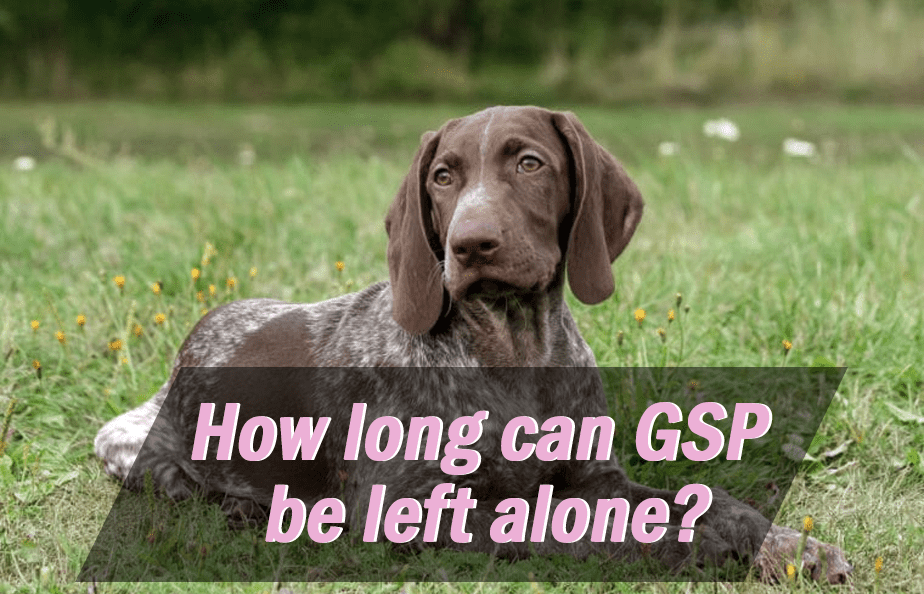Are you thinking of getting a four-legged friend to join the family? Congrats! You are going to have a life full of love and cuddles! This especially stands true if you are getting a German Shorthaired Pointer!
German Shorthaired Pointers are known for their athletic, high energy, and boisterous personalities. But, do you know they are big softies at heart? GSPs are lovely family dogs because they give strong companionship to the people they live with.
But, do you have a busy lifestyle and aren’t sure if you can give time to look after your new dog? Well, keep reading this article because I have answers to some pressing questions you may have, such as:
- Can German Shorthaired Pointers be left alone?
- Why shouldn’t you get a German Shorthaired Pointer?
- Can GSP sleep outside?
- Do GSP have separation anxiety?
A GSP puppy that is not more than eight weeks old should not be left alone for more than one hour, while an adult GSP cannot be left alone for more than six to eight hours. However, leaving your adult GSP alone for such a long time needs training and practice; otherwise, even a one-hour separation from his master can cause anxiety and restlessness.

Can German Shorthaired Pointers be left alone?
Yes, they can be left alone but not for more than three hours at a stretch. Three hours is a good time for adult GSPs that have not been trained to live away from their owners from an early age. Otherwise, you can even keep your GSP alone for about six to eight hours a day.
However, things are slightly different when you have a younger GSP at home. A three weeks old puppy cannot and should not be left alone for more than one hour. Puppies have demanding needs and need constant care and protection when they are this young.
You can eventually increase the time to two or three hours as the puppies grow older. But it should not be more than three hours at a time. Some may say it is okay to leave them for longer hours, but my experience with a GSP says otherwise.
But again, if you manage to train your GSP from an early age, they may do fine with longer hours.
But, here’s the challenge! When you leave your dog alone for such a long time, you need to ensure that you have kept enough distractions for the dog. Now, what do distractions mean? A distraction for your pet is anything that keeps them busy the whole time you are out.
Remember, German Shorthaired Pointers are extremely energetic dogs and like to always be on the move. When they are locked in a house, a room, or a crate for a long time, they may resort to destructive behavior out of boredom.
A bored dog is unhappy, and things can worsen when nobody is at home. Therefore, if you have long working hours away from home, it is best to think twice before getting a GSP.
But are you adamant about getting a GSP only? If so, then early training and practice when he is a puppy can help you deal with this issue.
You should know that GSPs are rightfully called Velcro dogs. They get the name because of their extreme attachment to their owners and want to cuddle all day and every day. Hence, leaving such a dog for long hours alone can be challenging.
So, how can you keep your German Shorthaired Pointer distracted or entertained when you are not around. You need to make sure that they are not bored! Here are a few tips based on how I do it; check it out!
Lots of morning exercise
I say morning exercise because when I am out the whole day, my GSP is tired and mostly sleeps during the day. Remember how GSPs are big packets of energy? Yes, so as a responsible pet parent, you must ensure that all their energy demands are met.
If they don’t get the chance to expel their energy, they become restless, and you will probably come home to half-chewed furniture ( talking out of my experience!)
Therefore, how do you ensure that they use up their built-up energy every day? By simply taking them out for a game of catch or a morning jog! Also, the exercise time should not be less than 45 minutes in case of a GSP!
Schedule the morning routine one to two hours before you leave for work so that your dog is very tired by then.
Treats and toys
Food dispensing toys are a great way to keep your dog distracted when you are out. Make it a habit to leave your dog’s favorite chew toy whenever you leave them alone. That way, your dog will relate your absence with a reward (chew toy!)
The chew toy should sustain the time of your absence so make sure you choose one accordingly.
Keep comforters
And by comforters, I mean anything you feel your dog may find comfort in when left alone. You can keep your old clothes or bedding with your scent so that your friend doesn’t miss you so much.
For some dogs, it helps if you keep the television on. It makes them feel that there is somebody else in the house.
Schedule a playdate
You can do this if your neighbor or a friend that has a furry friend your GSP can get along with. You can schedule a time with your friend when you are out so that your GSP gets a chance to spend time with his friends and not remember you.
Don’t draw the window curtains
Some dogs like staring through the window and getting a sense of what’s happening around them. They can easily get entertained by just staring at the cars or the passerby through the window.
However, if you intend to do this, then make sure the window is properly locked. If dogs see something that excites them, then they may try to push the window open and run away.
Do German Shorthaired Pointers have separation anxiety?
Yes, absolutely! As mentioned above, GSPs are Velcro dogs that get attached to their owners a little too much. If they don’t see their owner around for long, they tend to develop separation anxiety.
Also, you must know that separation anxiety is prevalent among every dog that has a strong attachment bond with its masters. A dog with separation anxiety is prone to destructive behavior if the issue is not checked.
So, how do you spot a dog with separation anxiety? Here’s what you should watch out for!
Chewing and digging
Do you often find your dog chewing on furniture, the rug, or anything else when you return home? If so, then your dog probably suffers from separation anxiety. Chewing and digging are the first forms of behavior dogs resort to when they are anxious.
You will find pits dug out in the yard or anywhere else when you are not around. Such behavior is visible only when the owner is not at home.
Constant howling and barking
Your dog will continue to bark and howl whenever you leave them alone. Your dog doesn’t need a reason to do this, and can even go on for hours. If your neighbor complains or informs you of this behavior when you are out, then your dog needs attention and care.
Urinating and defecating
Your dog will urinate or defecate in the most unusual places when you are not around. Dogs usually do something out of the box when they want their owner’s attention. So, if you find your dog urinating on the rug, then always give extra attention.
Pacing
Your dog will keep pacing around the house in circular patterns or straight lines when you are not home. If anybody spots your dog doing that when you are not around, then it is a tell-tale sign that your dog suffers from separation anxiety.
They will appear restless and move from one spot to the other. They may not even respond to the commands of other people in the house.
Overeating or loss of appetite
Overeating is also a very common sign among dogs with separation anxiety. This is most seen in dogs whose owners are gone for a very long time or the dog is in a new house. Most people may think that the dog is just hungry, but that’s not always the case.
Dogs who overeat because of anxiety usually tend to eat double their regular quantity.
But again, loss of appetite is also another sign of separation anxiety. Your dog may not eat for a few days after his owner is gone.
Why shouldn’t you get a German Shorthaired Pointer?
While there are many reasons why you should get a GSP, there are an equal number of reasons why you shouldn’t get a GSP! Some of the reasons why not are:
They like to prey
GSPs have stronger preying and hunting instincts than most dog breeds. This instinct of theirs may become a problem if your neighborhood has a lot of pets like dogs or cats. GSPs like to chase after smaller animals such as rabbits or cats.
In fact, it may be problematic to get a GSP home if you already have another pet. Their prey drive is so strong that it may get the better of them.
They like to jump on people
Yes, this trait is very much inherent in most GSPs. They are super energetic and always seem excited and hence will jump on anybody they love. While this is very cute to look at, it can be problematic if you have small children at home.
Given their big size with long legs, they can easily knock off small children with their jumping abilities.
They thrive on affection
You must know how affectionate and loving GSPs are. They thrive on companionships and are super clingy with the people they love. And when they don’t get the attention they want, they may indulge in destructive behavior or suffer from depression.
Therefore, GSPs can be a handful and are not meant for somebody who has long hours of work.
They take time to mature
GSPs may grow to full size by the time they are 2 years old, but their minds will be like that of a puppy. This breed takes time to mature, thus making it difficult to handle if you are a beginner.
You need to be on your toes when you take your dog out because your friend’s quirky and adventurous nature may make them chase after anything exciting. They need a lot of training and exercise every day.
Can German Shorthaired Pointers sleep outside?
Yes, your GSP can sleep outside, but it may not be a wise decision. When dogs are kept outside, they are exposed to many dangerous environmental factors. There may be dangerous insects or frogs that may bite your dog, or they may chew on some poisonous mushrooms in the backyard.
Also, GSPs like to be with the people they live with, and keeping them outside may cause separation anxiety. They may resort to destructive behavior, which will eventually cause more problems for you.
Hence, keeping your GSP outside is a bad idea!
Conclusion
GSPs love people and thrive on attention. They don’t like being left alone outside or alone in the house for long hours. If you are thinking of getting a GSP or have a GSP, then keep these points in mind. Leaving them alone for long hours is not an option if you own a GSP.
One of the first duties of a responsible pet parent is to make sure that your dog is happy and well-fed. Therefore, commit to getting a GSP only if you think you can invest enough time, energy, and finance in your dog.

